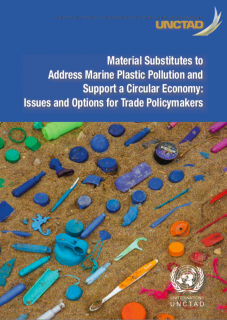
Plastics are ubiquitous in modern life. They are used in a vast diversity of products, ranging from consumer durables such as televisions, toys and clothes, to construction materials, vehicles, clothing and packaging for food and beverages. This paper explores options that exist to promote plastic substitutes along with the issues, challenges and considerations that policymakers are likely to face, particularly from a trade and sustainable development perspective.
It also provides a categorization of the plastic substitutes, explores definitional issues around the concept of biodegradability, and sets out some key criteria that could be used to evaluate the merits and demerits of various types of plastic substitutes. Furthermore, it provides a preliminary assessment of market and trade-related trends in selected examples of plastic substitutes with an emphasis on natural fibres of export interest to developing countries, and explores trade policy initiatives that could be pursued to support the scale-up of plastic substitutes.
